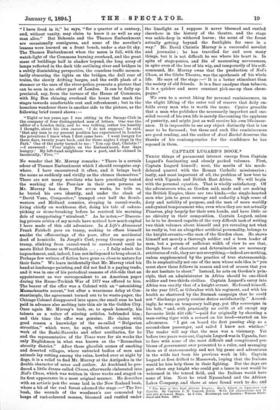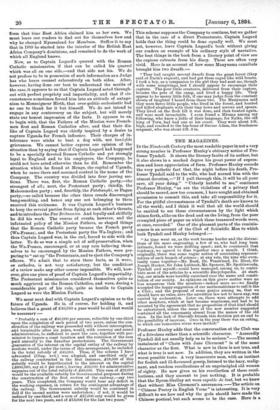CAPTAIN LUGARD'S BOOK.*
THREE things of paramount interest emerge from Captain Lugard's fascinating and closely packed volumes. First, Captain Lugard himself ; next, the merits of his much- debated quarrel with the Roman Catholic missionaries ; lastly, and most important of all, the problem of how best to deal with Uganda and British East Africa. We will begin with the personal equation. That is wholly satisfactory. Of the adventurers who, as Gordon said, made and are making the British Empire, there are two kinds,—the single-hearted men who join to great courage and audacity a high sense of duty and nobility of purpose, and the men of more worldly and cynical temperament who, even when they are not actually Pizarros, play largely for their own hands, and have little or- no chivalry in their composition. Captain Lugard, unless he is to be deemed capable of the very difficult task of writing two thick volumes about himself and yet revealing not what he really is, but an altogether artificial personality, belongs to the knight-errants,—the men of the Gordon class. He shows himself not merely a thorough soldier and a born leader of men, but a person of sufficient width of view to see that, though force of character and determination are necessary attributes of rule, they are not everything,—indeed are nothing, unless supplemented by the practice of true statesmanship. He is emphatically not one of the men whose sole idea is "you must show these fellows in season and out of season that you do not hesitate to shoot." Instead, he acts on Gordon's prin- ciple, that an administrator in Africa should be one-third soldier and two-thirds civilian. Captain Luga.rd's entry into- Africa was exactly that of a knight-errant. He found himself, in the year 1887, at Gibraltar with his regiment, and with his health so shattered by the Barmah campaign that he could not " discharge purely routine duties satisfactorily." Accord.- ingly, he went on temporary half-pay, put fifty sovereigns in his belt, " and, with practically no outfit at all except my favourite little 450 rifle "—paid for originally by shooting man-eating tiger with a reward on his head—started on his adventures. " I got on board the first passing ship as a. second-class passenger, and sailed I knew not whither." The reader will say that the man was a visionary. Yet before two years were out, Captain Lugard was in Uganda, face to face with some of the most difficult and complicated pro- blems of government ever presented to a ruler, and managing them as if statesmanship and not big game and adventures in the wilds had been his previous work in life. Captain Lugard at first drifted to Massowah, hoping that the Italians would let him help them in their fighting. But the days are past when any knight who could put a lance in rest would be welcomed in the tented field, and the Italians would have none of him. Next he tried Nyassaland and the African Lakes Company, and there at once found work to do; and • The Rise of Our East African Empire: Early Efforts in Byaadand anA Uganda. By Captain F. D. Lugard, D.S.O. With 130 illustrations and 14 spec ally prepaloa Maps, In 2 vols. Edinburgh and London: William Black- wood and Sons. 1893.
from that time East Africa claimed him as her own. We must leave our readers to find out for themselves how and why he changed Nyassaland for Mombasa. Suffice it to say that in 1889 he started into the interior of the British East Africa Company's dominions, and remained to do the work of which all England knows.
Now, as to Captain Lugard's quarrel with the Roman 'Catholic missionaries, if that can be called his quarrel which was all on one side,—and that side not his. We do not profess to be in possession of such information as a Judge has who hears counsel exhaustively on both sides. After, however, having done our best to understand the merits of the case, it appears to us that Captain Lugard acted through- out with perfect propriety and impartiality, and that if cir- cumstances sometimes forced him into an attitude of antago- nism to Monseigneur Hirth, that over-politic ecclesiastic had no one to thank for it but himself. We do not intend to engage in any controversy on the subject, but will merely state our honest impression of the facts. It appears to us, to begin with, that the Fathers of the Mission were French- men first and Roman Catholics after, and that their dis- like of Captain Lugard was chiefly inspired by a desire to
capture Uganda for French influence. Their charges of in- tolerance were sticks to beat a dog with, not bond-fide grievances. We cannot better express our opinion of the
situation than by saying that if Captain Lugard had happened to be a specially devoted Roman Catholic and yet strongly
loyal to England and to his employers, the Company, he could not have acted otherwise than he did. Remember the situation which he found at Mengo, the capital of Uganda, when he came there and assumed control in the name of the Company. The country was divided into four jarring sec- tions. There was, first, the Roman Catholic party,—the strongest of all ; next, the Protestant party; thirdly, the Mahommedan party ; and, fourthly, the Fatabanghi, or Pagan party,—so called because the other three creeds discouraged bang-smoking, and hence any one not belonging to them received this nickname. It was Captain Lugard's business to keep the several parties from flying at each other's throats, and to introduce the Paz Britannica. And loyally and skilfully he did his work. The course of events, however, and the infatuated policy of the Mission Fathers, so shaped things that the Roman Catholic party became the French party (Wa-Franza), and the Protestant party the Wa-Ingleza ; and thus Captain Lugard was, in the end, forced to side with the latter. To do so was a simple act of self-preservation, when the Wa-Franza, encouraged, or at any rate believing them- selves to be encouraged by the Mission Fathers, were pre- paring to " eat up "the Protestants, and to eject the Company's officers. We admit that to state these facts, as it were, ex cathedra, is not very satisfactory, but the conditions of a review make any other course impossible. We will, how- ever, give one piece of proof of Captain Lugard's impartiality. The Protestant missionaries considered themselves quite as much aggrieved as the Roman Catholics, and were, during a considerable part of his rule, quite as hostile to Captain Lngard as were the Mission Fathers.
We must next deal with Captain Lugard's opinion as to the future of Uganda. He is, of course, for holding it, and believes that a grant of £40,000 a year would be all that would be necessary :-
" Probably a sum of £40,000 per annum, reducible by one.third capon the completion of each period of two years, unless the con- struction of the railway was proceeded with without interruption, .and terminable after six years, would, with economy and sound administration, be sufficient to meet the case, together with per- mission to impose a coast taxation and the remission of the sum paid annually to the Zanzibar protectorate. The Government guarantee of the interest on the capital outlay of the railway by sections would, under the terms of this arrangement, be included in the total subsidy of £40,000. Thus, if the scheme I have advocated (Chap. xvii.) was adopted, and one-third only of the railway constructed in the first instance, £18,000 of this subsidy would be hypothecated to the interest on the capital (Z600,000, say at 3 per cent.), leaving £22,000 for administrative expenses out of the total subsidy of £40,000. This sum of £22,000 would be the available subsidy for Governmental purposes during the construction of the first section of the railway,—say two Tears. This completed, the Company would bear any deficit in the working expenses, in return for the contingent advantage of the railway. The Government subsidy would be continued in full if the second section were undertaken ; if not, it would be reduced by one-third, and a sum of £27,000 only would be given for the next two years, and of £13,000 for the last two years."
This scheme supposes the Company to continue, but we gather that in the case of a direct Protectorate, Captain Lugard holds that the thing could be done equally well. We must not, however, leave Captain Lugard's book without giving our readers an example of his ordinary style of narrative. The best things in the book from a literary point of view are the copious extracts from his diary. These are often very vivid. Here is an account of how some Manyuema cannibals brought him two dwarfs :—
"They had caught several dwarfs from the great forest (they said at Bruin's request), and had got them caged like wild beasts. I took a boy, as a companion to the girl they had sent me, though with some misgivings, lest I should appear to encourage their capture. The poor little creatures, delivered from their captors, became the pets of the camp, and lived a happy life. They appear to be merry little folk, if one may judge from the constant shouts of laughter I heard from these two. The Manyuema said they were fierce little people, who lived in the forest, and hunted and killed elephants with their tiny bows and arrows and spears. They lived on the flesh till it was done, and then hunted again. and were most intractable. I even found a Mbuma among my following, who knew a little of their language, for Nyika, the old king of Toru, had had one at his court. They were about 3 ft. high, and reached to the hip-bone of Suroor Adam, the Soudanese sergeant, who was about 6 ft. 3 in.











































 Previous page
Previous page